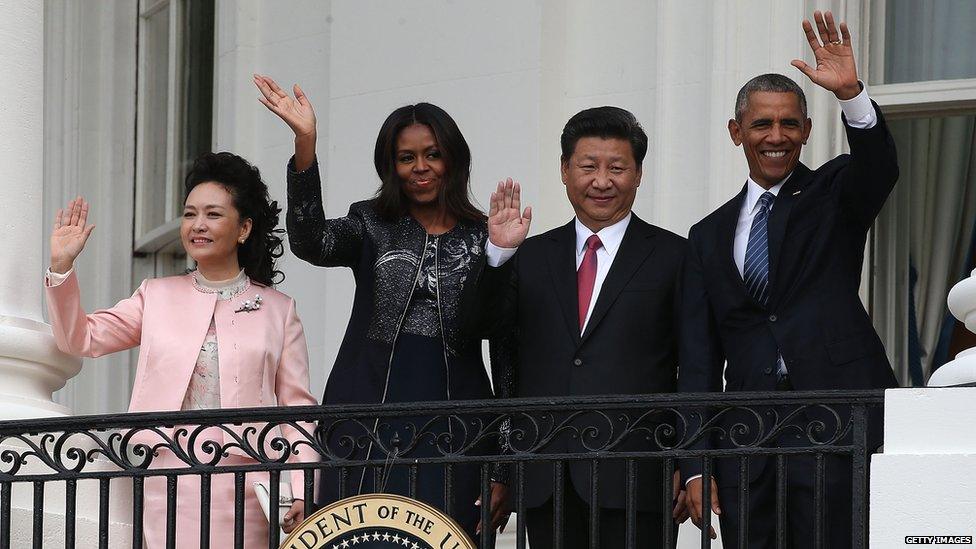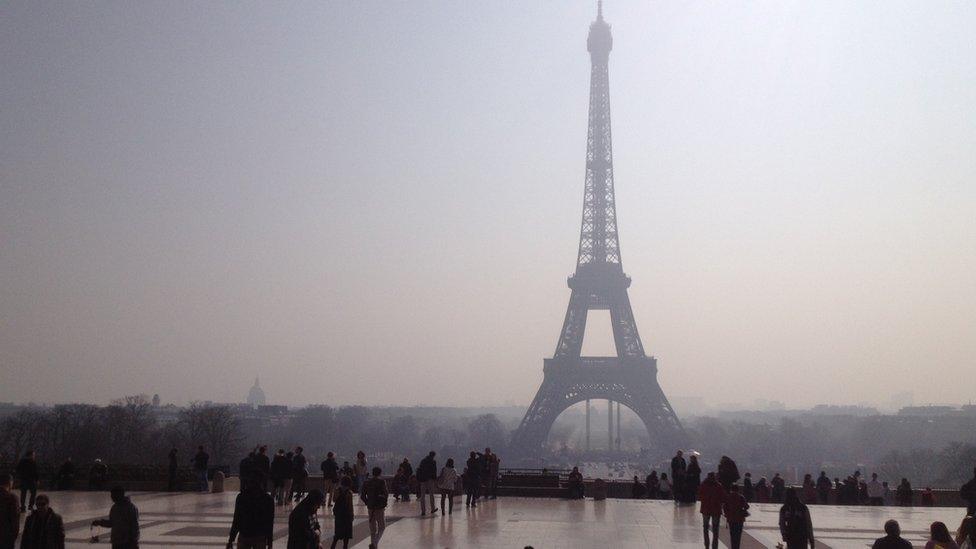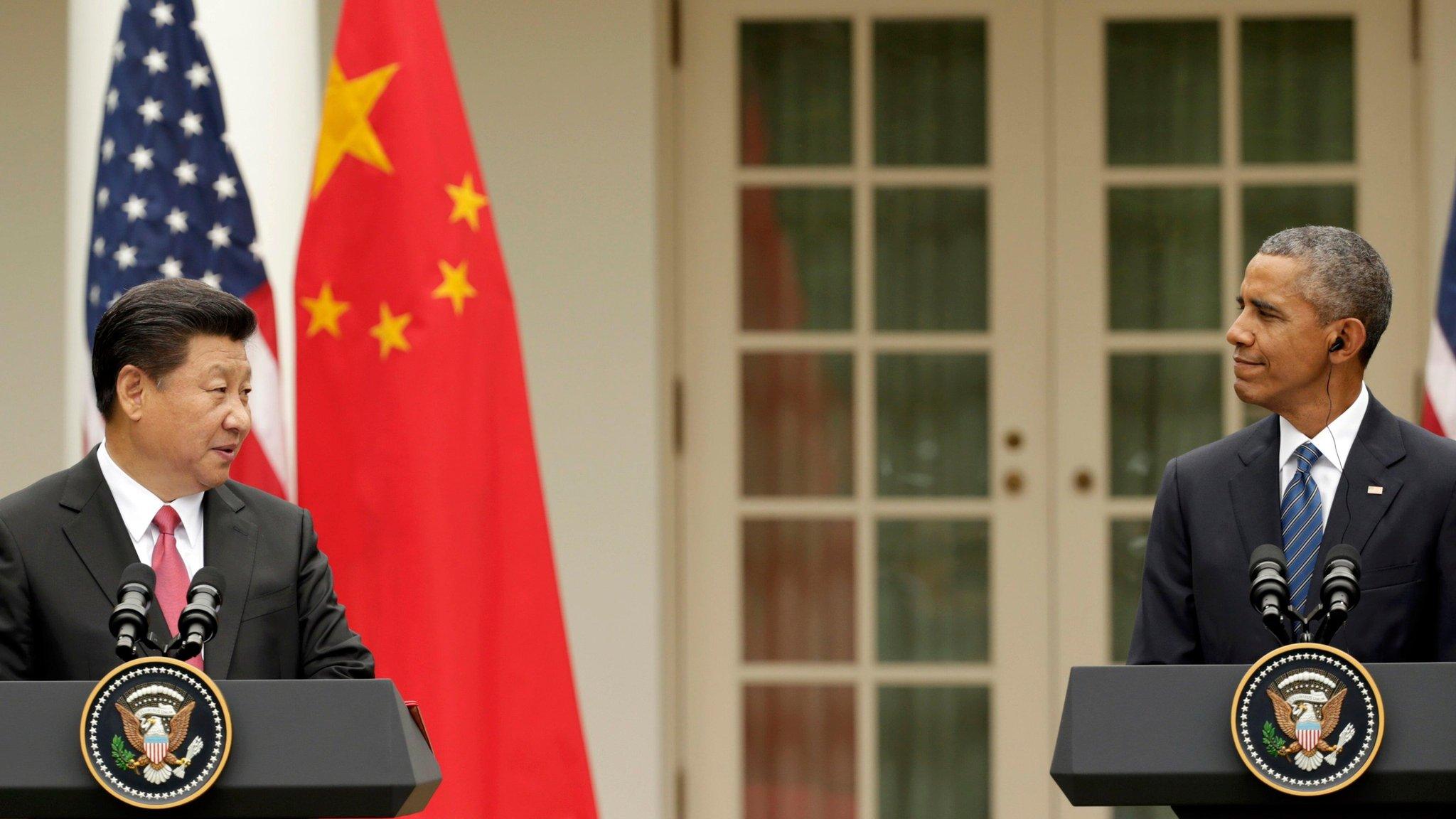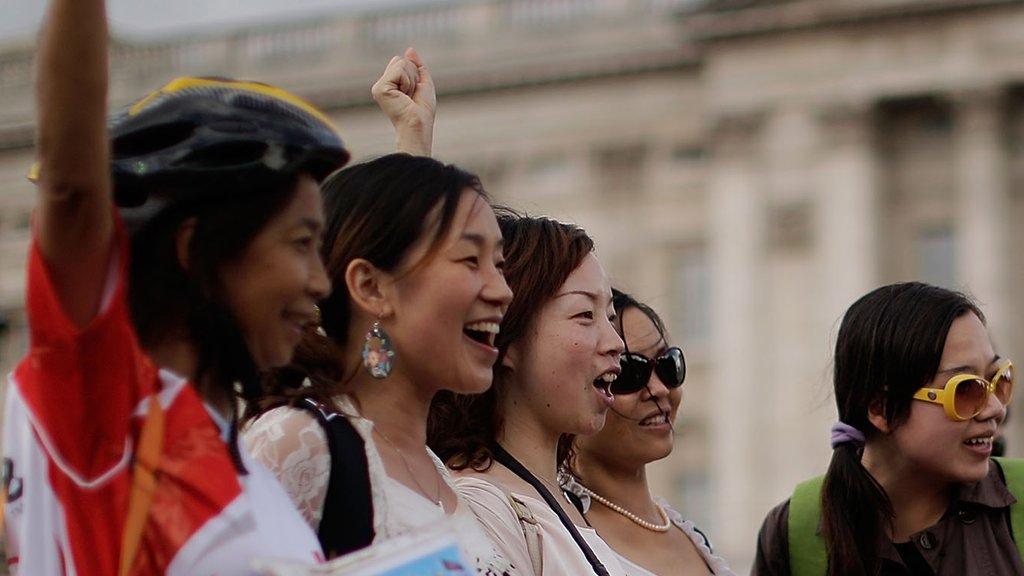Warming tempts China in from the cold
- Published
- comments

All smiles at the White House as China and the US find common ground on climate change
It's been a bit of a dream week for the "warmist" brigade!
Clambering out of his tiny Fiat 500 car, the Pope came to Washington to tell the world that dealing with climate change can no longer be left to future generations.
He emphasised "that we have a sacred obligation to protect our planet".
Even though the soon to be ex-House Speaker John Boehner was moved to tears, external by the mere presence of Pontifex, external, Republicans generally were not so wowed.
Perhaps inspired by the man in the snazzy white cassock, the leaders of the US and China issued a joint statement on climate change that has been headlined on the announcement of a national cap and trade scheme for China to start in 2017.
The statement from the White House shows that China has gone even further, signing up to a "common vision" with the US on the Paris climate agreement that sets out their "shared understandings" with talk of a long-term low-carbon transformation of the global economy and ramping up ambition over the years.
And at a time when trust on the reality of how much emissions can be curbed has wavered (I'm looking at you folks!), the US-China statement said both countries "agreed on the need for an enhanced transparency system to build mutual trust and confidence, and promote effective implementation, including through reporting and review of action," in the 2020 period of any new climate deal.

Paris will see negotiators from all over the world attempt to agree a new climate deal
This will hearten the US who have been hankering after a robust verification system for years.
Many commentators believe that overall the statement has strengthened Mr Obama's position.
"It has strengthened the President's hand, in saying that he is getting the world's largest emitter to move and that China is starting to walk the talk," said Alden Meyer, a long-time participant in international climate talks, who represents the Union of Concerned Scientists.
"Those who say that China is doing nothing are just blowing smoke. I think it will definitely strengthen the President's domestic political position, but I don't think it will change too many of those opponents' minds."
Problems remain
Undoubtedly, the statement helps clear away some of the lingering obstructions on the highway to a Paris deal.
But all this White House rose-garden cosiness doesn't necessarily mean that everything is suddenly smelling sweet.
In the UN negotiations, China is a founder and key member of the Like Minded Developing Countries (LMDC) group, which includes Ecuador, Bolivia, Venezuela, India, Saudi Arabia and others.
Many of these countries are keenly opposed to any change in the long-held, simplistic UN division between rich and poor, based on where the world was in 1992.
According to reports, external, at a meeting earlier this month in India, the LMDCs "expressed concern regarding shifting the financial burden to developing countries and the attempt to expand the list of countries with obligations under the Convention (UNFCCC) to provide climate finance and at the same time shrink the list of countries eligible for receiving climate finance".
China, it seems, wants to keep a foot in both camps.
The LMDC statement on climate finance contrasts strongly with China's new commitment at the White House that developing countries should also put their hands in their pockets to help the really poor states.

Of similar minds?
In the United Nations climate negotiations, complex formations of countries have evolved over the past 20 years. One of the most recently formed is the Like Minded Developing Countries group (LMDCs), made up of 13 nations - Argentina, Bolivia, China, Cuba, El Salvador, Ecuador, India, Iran, Malaysia, Nicaragua, Saudi Arabia, Venezuela, and Vietnam.
But this being the UN, it's not as straightforward as that. China and all the others are members of the G77 group which, confusingly, has 133 members. India and China are also in a type of BRIC formation called the BASIC group, while others are part of geographic formations such as the African group and the Association of Small Island States (AOSIS). Then there are two central and South American groupings, ALBA and AILAC.
Confused? There's a grouping for that too!

To get the ball rolling, China chipped in a commitment of $3bn to help developing countries. That may not go down well with Bolivia's Evo Morales and co.
"The like-minded dynamics are interesting because China has been a creator and key player in that grouping but the position of that group is increasingly at odds with what China is saying in Washington," said Alden Meyer.
Perhaps it's ideological, perhaps it's just negotiating, but sometime between now and the middle of December, China is going to have to square this circle.
Perhaps it will take the presence of the Pope in Paris to allow all parties to make the necessary final compromises?
Keep an eye out for Fiat 500s on the roads around Le Bourget!
Follow Matt on Twitter @mattmcgrathbbc, external.
- Published25 September 2015

- Published21 September 2015
